Jonathan Lack's Top 10 Video Games of 2018

After a few lean years at the start of this console generation, it is abundantly clear that we are living in an absolute golden age for video games. At the end of 2016, I remember thinking I was never again going to have a Top 10 list as brutally competitive to construct; then 2017 came along, delivered bold new entries in almost all of my favorite ongoing franchises, and made 2016 look like child’s play.
2018 has been a similarly great year, one perhaps even more surprising than the great years of recent memory. Amazing video games came from all directions, some expected (Sony and Nintendo’s first-party development continuing to hit it out of the park), some completely out of the blue (indie developers delivering a steady string of jaw-dropping artistic visions). And once more, I find myself at years’ end struggling mightily to narrow things down to a mere 10 titles – and mightier still to actually rank them.
A few short observations on the list itself before we begin: For the first time, I played all of these games on a grand total of just two consoles – the PS4 and the Nintendo Switch – as Microsoft for the second year in a row failed to produce any notable exclusives and the Nintendo 3DS, a stalwart of my countdowns, survived mostly on ports and remakes. That said, there are more third-party and cross-platform games on this list than I had last year – five, if you count console/PC as cross-platform – despite the strength of exclusives. My Honorable Mentions list is just chock-full of genuine greatness, and looking at what did and didn’t make the cut for the Top 10 itself, I’m pleased with just how completely this countdown reflects my personality, interests, and obsessions, as all honest ‘best of’ lists should.
Oh, and this Top 10 technically contains 11 games, though when you see why I think you’ll forgive the incongruity. Read about all of them after the jump…
10. Dragon Ball FighterZ
Developed by Arc System Works – PS4, Xbox One, PC
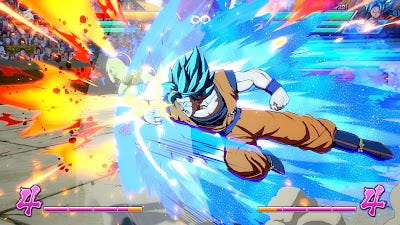
Dragon Ball FighterZ is an interesting case study in how much the quality of a core gameplay system and strong aesthetics can forgive a variety of flaws. For FighterZ easily has the longest laundry list of problems of any game on this list: From an awful, overlong, far too easy and much too repetitive story mode; to a cute but ultimately cumbersome and confusing lobby system; to spotty online play and DLC that ranges from grossly overpriced (the FighterZ pass, which nets you the eight characters added post-launch, runs $35, which is usually more than the base game itself these days) to actively predatory (unlocking the game’s 3 playable hidden characters is so cumbersome that ponying up for paid access is virtually required).
And yet, despite all that, FighterZ is still easily, without question, one of my favorite games of the year. The fighting system itself is so wonderfully polished, more accessible and easy to learn in its basics than most comparable fighting games, but with such an extreme amount of depth that it’s already become a favorite in fighting game competitions. And the graphics are one of the year’s foremost achievements, a stunningly fluid, spot-on accurate recreation of the anime, looking less like digital graphics and more like hand-crafted, pen and paper drawings, all of it endlessly rewarding for long-time fans of the franchise, and filled with enough eye-candy to win over newcomers. When you’re in a match, controlling what looks like the anime itself come gloriously to life, listening to the original voices (the game defaults to Japanese, which gets it even further into my good graces), and engaging in combat that is breathlessly fast-paced yet also deeply strategic, everything else melts away. As a lifelongDragon Ball obsessive, this is one of the year’s most purely enjoyable experiences, and one that I’m sure to boot up at regular intervals for years to come.
9. Persona 3: Dancing Moon Night
& Persona 5: Dancing Star Night
Developed by P-Studio – PS4, PS Vita
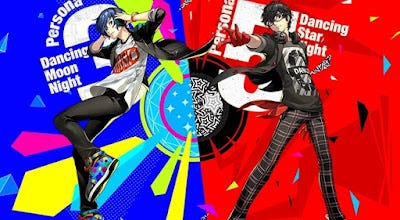
Sticking with fanservice done right, the outstanding Persona franchise continued its long parade of spin-offs-that-should-probably-be-bad-but-are-anything-but with these two amazing rhythm games, sequels to 2015’s Persona 4: Dancing All Night. These entries, developed and released simultaneously, sport a slightly thinner tracklist than that game, but in every other way, they’re an improvement. The ‘Commu’ system (renamed ‘Social’ in the West) provides quick, concentrated bursts of character-driven comedy and pathos with the casts, without the sometimes overwhelming verbosity of the visual novel that accompanied the Persona 4 dancing game. Those events interact nicely with the core rhythm game, as playing through the various songs nets you additional Commu scenes, which, when played, give you further rewards for dancing. It actively encourages the player to seek out everything the games has to offer, and it’s such a joy to do so that I’ve already attained the Platinum trophy in both gamestwice, once in Japanese and once in English. And of course, the central dancing mechanics are as good as they were in 2015, perhaps even a touch more polished and precise. Playing through some of gaming’s best music, lovingly remixed and animated with genuinely impressive dancing and joyously challenging gameplay, is one of the purest blasts of fun I had all year. If you have any affection whatsoever for either Persona 3 or Persona 5, these two are a no-brainer. They are happiness personified.
8. Red Dead Redemption 2
Developed by Rockstar Games – PS4, Xbox One
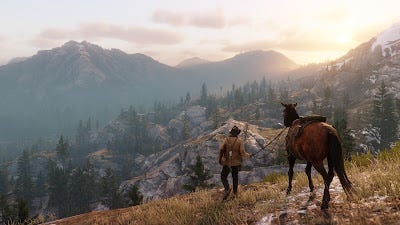
With Red Dead Redemption 2, Rockstar Games finally grew up. The game has its flaws – its world is too big and its length too vast for its own good, the controls are needlessly wonky, there’s too much combat, the Epilogue chapters feel like undercooked DLC, and apart from the masculinized Sadie Adler, this studio still flounders desperately when it comes to writing women – but what it does well feels like a significant evolution for a studio often prone to sophomoric writing and boundless pessimism. It’s not a surprise that Red Dead 2’s world is big and beautiful and bursting with character; the surprise comes in how much Rockstar makes you feel like a living, breathing part of that world, through a variety of complex interlocking systems allowing for a nearly limitless amount of player-motivated expression, and how in its home stretch the game capitalizes upon all of that to tell a story about morality and absolution that is soulful, smart, and deeply, painfully affecting. Arthur Morgan is the best character Rockstar has ever created, brought vividly to life by Roger Clark in the year’s greatest vocal performance, and in the scenario he and the player are presented with in the game’s closing act, Rockstar sheds completely its penchant for nihilism and anarchy and asks of us some of the most profound and meaningful questions ever posed in a video game. This feels like a new Rockstar, one built on a bedrock of genuine humanity that I had not seen in their work before, and for whatever faults this sequel may have, that emotional foundation shines through as one of 2018’s most profound accomplishments.
7. God of War
Developed by Santa Monica Studio – PS4

Speaking of long-standing game developers blossoming into a newfound maturity, 2018’s God of War saw a series primarily known for kinetic hyperviolence and cartoonish sexuality, all aimed squarely at the 15-year-old boy inside of us, transformed into a story about fatherhood and atonement, realized with a stunningly elegant sense of grandeur. Christopher Judge turned in one of the year’s best performances as Kratos, a being of primal rage trying to a better man for his son Atreus, as the two embark on a journey to scatter his late wife’s ashes. The game’s world is jaw-droppingly beautiful, the third-person action combat might be the best ever crafted, exploration is deeply rewarding, and the fluid ‘no cuts’ visual style, perhaps the year’s most impressive technological feat, is so much more than a mere gimmick. The Norse mythological setting, meanwhile, serves as both a uniquely exciting backdrop and a constant source of thematic resonance, its operatic mythos woven in deftly amidst the intimate father-and-son narrative core. The game’s story feels a little bit thin to me down the home stretch, and the ending baits a few too many sequel hooks for my liking, but there’s a reason God of War seems to be the one game this year everyone agrees deserves a spot on this kind of list. For as a symbol of how far video games have come, as a medium of both aesthetic and thematic expression, you won’t find many AAA titles more emblematic of gaming’s potential than this.
6. Splatoon 2: Octo Expansion
Developed by Nintendo EPD – Nintendo Switch
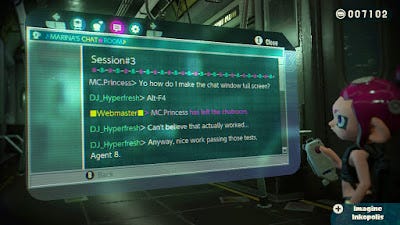
Splatoon 2 didn’t quite make my Top 10 list last year, even though I absolutely loved and frequently returned to its outstanding online multiplayer, easily the best and most addictive I’ve encountered in years. But as soon as I started sifting through everything this single-player expansion has to offer, there was no doubt in my mind this massive chunk of DLC would feature prominently on this year’s countdown. The Octo Expansion is one of the wildest, most consistently surprising bursts of creativity Nintendo has ever crafted. It reminds me a lot of Super Mario Galaxy 2, in terms of just how expansive a sense of imagination is on display here, just how pliable the core gameplay mechanics become across the campaign’s 80 levels, transforming Splatoon 2’s ink-shooting fundamentals into a robust platformer, a wickedly smart puzzle game, a third-person cover shooter, and even an astonishingly effective stealth game. The Octo Expansion tries on a dizzying array of gameplay hats, and even if not all of them fit – though most, I would argue, do – the sheer amount of invention on display is worth standing up and applauding. Even the expansion’s writing is unexpectedly great, consistently witty and unpredictable, while the subway aesthetics and grungy octo-pop soundtrack perfectly accent the base game’s already delightful punk aesthetic. Endlessly inventive and ingeniously challenging, it’s possible no other $20 purchase offered so much bang for one’s buck in 2018.
5. Marvel’s Spider-Man
Developed by Insomniac Games – PS4
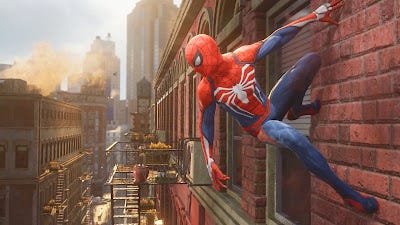
Playing through Insomniac’s absolutely incredible Spider-Man game, the thought occasionally crossed my mind that an obsessive Spidey fan must have made a wish on a cursed monkey’s paw to bring this game into existence. We got the best Spider-Man game we could ever hope for, the most pitch-perfect use of an external license ever utilized in a video game, while the rest of the world became progressively more troubled and depressing around us. And that thought would leave me temporarily guilt-ridden, until I remember cursed monkey’s paws aren’t an actual thing.
Simpler explanation: the fine folks at Insomniac happen to be both incredibly talented game designers and passionate fans of the webhead themselves, and Marvel simply hit the jackpot when they gave the studio the go-ahead to make the Spider-Man game of our dreams. Mechanically ingenious every step of the way – there is no traversal mechanic in the history of gaming more purely enjoyable than swinging around New York City in Spider-Man, and the combat is insanely deep, fluid, and fun – while telling as rich and well-produced a Spider-Manstory as we’ve ever seen on screen, this is simply a great video game, whether you love the wall-crawler or not. And if you are a long-time fan, it’s enough to feel like a dream come true. This is the best first-party exclusive created for the PS4 to date, and there’s no game this year that left me more excited for an inevitable sequel.
4. Gris
Developed by Nomada Studio – Nintendo Switch, PC

Of all the games on this list, Gris has been the hardest to find the words to describe. Some of that is just recency – the game only launched on December 13th– but the bigger reason, I think, is because of how completely it exists in a realm beyond verbalization. There is no spoken or written dialogue in the game, no text of any kind beyond brief button prompts two or three times. The story is told entirely through aesthetics, through the absurdly beautiful, hand-painted watercolor images – in their clear geometric patterns, they remind me a lot of Oskar Fischinger – and the absolute knockout of a soundtrack by Berlinist. The story is opaque, concerning a woman who has her voice stolen, and goes on a journey to get it back. The gameplay, a mix of basic platforming and environmental puzzles, offers something of an empowerment narrative, as you start with nothing but the ability to move and jump, and gradually reclaim more and more powers as the game progresses. None of these elements can be untangled from one another; each works in harmony to create a dense, penetrating sense of mood and atmosphere, but also to create a profound sense of thematic resonance – though said resonance shall, I assume, be somewhat different to all who encounter it.
For while Gris’ beauty overwhelmed me at various points, I also spent a lot of the game retreating into my own mind, almost meditatively, finding my thoughts associating in all sorts of deeply emotional, existential directions. The story’s power comes, in some way, from these associations – from what Gris asks you to offer of yourself, what pieces of your mind and heart you are willing to commit alongside its magnificent aesthetic being. It is a truly profound, masterful piece of abstract art, one of the great avant-garde video games; in it, I saw a story about what it means to lose everything, and to slowly and surely move to get it back through a world that continually threatens to swallow one whole in the darkness. But that inexorable march towards the light, which the game is committed to illustrating all the way through its note-perfect final moments, is one of the most hopeful, life-affirming visions I have ever glimpsed in this medium. Gris isn’t just a great work of art; it’s a gift to the human soul.
3. Super Smash Bros. Ultimate
Developed by Sora Ltd & Bandai Namco – Nintendo Switch

If crafting Top 10 lists were a simple mathematic equation, Super Smash Bros. Ultimate would be my number one game of the year. In our two-part 250thWeekly Stuff Podcastcelebration, I named Super Smash Bros. – as a unified, ongoing entity – my third-favorite game of all time. Super Smash Bros. Ultimate is, without question, the best version of Smash Bros., with the series’ tightest and most expertly refined gameplay to date, a surprisingly robust and engaging set of single-player offerings, jaw-dropping visuals that may be the Nintendo Switch’s best-in-class, an outstanding and almost indescribably vast soundtrack, near-endless customization, 100+ excellent stages that can be transformed into 300+ excellent stages, and, of course, a complete and definitive fighter roster whose overwhelming scope is matched in the sheer, absurd amount of depth every combatant contains. The game is a passionate love letter not only to the many, many game franchises contained within, but to every player who has ever enjoyedSmash Bros. in the past, or is yet to discover it in the future. Masahiro Sakurai and his team have truly outdone themselves this time; this is a game of boundless ambition and even greater heart, and I feel compelled to express my deepest gratitude for its existence.
So why isn’t this my number one game of the year? Why isn’t a game that I’ve already poured nearly 50 hours into in less than a month, and shall surely devote many hundreds more in the years to come, not at the top of my list? It’s because evaluating art like this isn’t a simple mathematic exercise, and there are two titles this year I found more surprising, that captured my heart even more fiercely. And in any case, Smash Ultimate feels less to me like the achievement of 2018 itself than it does the latest and greatest culmination of an ongoing achievement that I’ve had the pleasure to watch unfold since 1999. What I have at the top spots feel more firmly like the achievements of this year, of this moment in time – and so, Smash Ultimate sitting happily at #3, the same position is occupies in my personal overall canon, feels like an accurate summation of its place in my 2018 experience.
2. Dragon Quest XI: Echoes of an Elusive Age
Developed by Square Enix – PS4 & PC

The Dragon Quest franchise is like an old, loving grandparent, sitting on their porch, set deeply in their ways; but if you stay by their side long enough, you’ll discover a fountain of wisdom that could only come with age and experience. After essentially inventing the console JRPG in 1986, Dragon Quest creators Yuji Horii, Koichi Sugiyama, and Akira Toriyama have stayed the course for three decades. Instead of trying to radically reinvent the wheel along the way, a la Final Fantasy in the mid-90s, the games have kept their traditions close to their chest, like the traditional turn-based battle system, medieval setting, confessing to Priests at Church to save, or complete lack of voice acting (the Western release of XI adds an English vocal cast, but you should really turn the voices off as soon as possible for the best, purest experience). That’s created a perception in the West that the games are largely crusty, outdated relics, but nothing could be further than the truth. For it is precisely in that lack of bells and whistles that Dragon Quest thrives, its grasp on its own fundamentals – of writing, of storytelling, of world-building, of characterization, of exploration, of strategic turn-based gameplay – so ridiculously strong that you wish more franchises would spend three decades honing their craft as superbly as this series has done.
Dragon Quest XI, then,is a bright, shining testament to all the wisdom this team has accumulated over the years. Even more back-to-basics in its fundamental narrative conceit than most games in the series, Echoes of an Elusive Age lays down a very simple mythological set-up – you are ‘The Luminary,’ a boy born to go on an adventure to defeat the looming forces of darkness – and then gets to work creating one of the richest worlds, deepest casts of characters, and some of the most blindsidingly impactful storytelling I’ve ever encountered in a video game. The visuals are just absurdly beautiful, Toriyama’s singular art style realized with profoundly lush color and texture thanks to the power of the PlayStation 4, and the battle system is a gift that keeps on giving, appearing overly simplistic at first only to continually reveal compelling new layers of depth all the way up to the very last battle. The story may not completely stick the landing when it comes to the multi-faceted endgame portion, but the journey along the way is what matters most, and it is just so unbelievably emotional, heartfelt, creative, and skillfully told that, every day, for the month I spent playing it, I could not wait to get home and spend more time withDragon Quest XI. The characters felt like real, living, breathing friends; the world like an actual, physical space I came to know like my own daily surroundings; the glorious MIDI soundtrack like a warm, comforting blanket. And every time I would feel I knew where the game was heading, or started feeling comfortable with the status quo, the story would rip my feet out from under me with a gracefully unexpected twist, turn, or character revelation that would leave me feeling deeply shattered, uplifted, or somewhere in between.
Other games on this list may be bigger technical achievements or involve more complicated gameplay systems, but for my money, there was no AAA narrative game this year more purely, consistently, profoundly rewarding than this one. Dragon Quest XI is a full-blown masterpiece, and we could all benefit by learning from what it has to teach us.
1. Celeste
Developed by Matt Makes Games – Nintendo Switch, PS4, Xbox One, PC
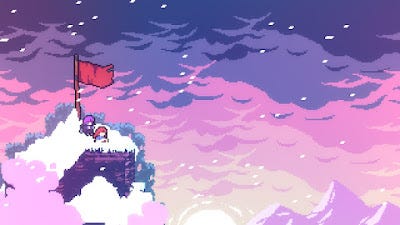
Platformers don’t usually tell stories. At most, they tend to have oblique narrative outlines – Bowser has kidnapped Princess Peach, Dr. Robotnik is enslaving adorable animals, King K. Rool stole Donkey Kong’s banana horde – and characters who are defined more by personality, movement, and appearance than they are interiority or complex motivation. Before playing Celeste, I just thought that was the natural state of things for platformers; that the genre’s penchant for invention, experimentation, and aesthetic variety meant narrative had to come second, had to exist as a setting for gameplay creativity rather than the lens through which the gameplay took on meaning.
Celeste fundamentally alters this paradigm. It takes the absolute best of what platform gameplay can be – a small, focused set of controls, easy to learn but increasingly, wonderfully difficult to master as the ingenious level design continually finds new, creative ways to put those controls to the test – and marries it to the best of what video games can achieve as a narrative, character-driven medium. Protagonist Madeline is visually composed of bright, blocky pixels and a few still animated portraits, but she is easily one of the year’s most vivid characters, a young woman dealing with anxiety, depression, and doubt in ways so painfully real it feels like we’ve known her all our lives. For many of us, we have – Madeline is that part of ourselves that never thinks we’re good enough, always doubts our path and position, and tries to cope in ways that make intuitive, rather than literal, sense. We’ve all tried climbing our own Celeste mountain, and we’ve all encountered a dark mirror image that tried to hold us back from reaching the peak. If we made it to the top, we only did it because we accepted that part of ourselves, and learned not only to live with it, but to thrive with it. And if we’re lucky, we might have opened ourselves up enough to make some good friends along the way.
Celeste tells this story through artfully written, deeply insightful, and frequently witty text-boxes, yes, but more importantly, it conveys this narrative through gameplay. Everything it wants you to know about Madeline – and everything it thus wants you to reflect upon in yourself – is embedded in the platforming, in the specific set of controls it implements and in the nature of the challenges and settings it asks you to master along the journey. Rarely have I seen a more tightly woven marriage of narrative and gameplay in a lifetime of playing video games, particularly once one arrives at the final level, where Madeline comes to a revelation about her personal demon and the game explodes into an unrelentingly joyous and difficult final push that is positively symphonic in its complete and total unity of artistic power. In that home stretch, the distance between the game’s story, the game’s mechanics, and the heart and mind of the player is as miniscule as it has ever been. The experience is nothing short of life-affirming.
Celeste is a perfect video game. Its music, its visuals, its writing, its level design, its pace, its length, its difficulty, its collectibles, its unlockable extras – nothing here is anything less than the absolute best version of itself, and no part fails to work in complete and utter harmony with every other component. Celeste is the best video game of 2018, but it’s also one of the most cathartic, therapeutic experiences I’ve ever had with a work of art – and for all the heart Matt, Noel, Amora, Pedro, Lena, Kevin & friends poured into it, I thank them deeply from the bottom of mine.
Honorable Mentions
(in alphabetical order)

Digimon Story Cyber Sleuth: Hacker’s Memory(PS4, PS Vita) offered fans of 2016’s best video game an alternate vantage on a great, underrated video game story, with vivid new characters moving through a frequently inspired side-narrative, with all the same great gameplay, JRPG combat, creature raising, and sharp, passionate writing as the original.
Hitman 2 (PS4, Xbox One, PC) is just as delightfully intricate a murder-driven clockwork puzzle box as its 2016 predecessor, even if the bigger maps and additional objectives occasionally left me feeling a touch more alienated from the proceedings; still, one of my biggest 2018 gaming regrets is not having more time to spend mastering every nook and cranny of these brilliantly designed, thoroughly silly levels.
Kirby Star Allies(Nintendo Switch) is the game I’m most disappointed I couldn’t include on my Top 10, in part because it is such a delightful, fun, creative low-stress platformer, and in part because it’s been so consistently underrated all year; playing through this in couch co-op with my brother is one of my favorite 2018 memories, and the steady stream of excellent free DLC demonstrated a great sense of commitment from Nintendo.
Octopath Traveler(Nintendo Switch) sported some of the year’s most eye-popping visuals and one of the best video game soundtracks ever, in service of an giant storybook’s worth of short stories with a cast of generally compelling characters. The game is structurally repetitive, yes, but it’s all bursting with humanity and creativity, and the outstanding battle system, an improvement on the similar mechanics of this team’s early Bravely Default games, helps it stay compelling for dozens of hours.
Pokémon: Let’s Go Eevee(Nintendo Switch) ditched one of the long-running series’ most sacred cows – wild Pokémon battles – and was ultimately all the better for it. With a faster-paced, surprisingly strategic new way to capture Pokémon, in addition to several tons of smile-inducing charm in creature animations, colorful graphics, and awesome costumes, Let’s Go Eevee (and its mostly-identical companion, Let’s Go Pikachu) made this well-worn classic feel new again, and that’s no small achievement.
Return of the Obra Dinn(PC, Mac) didn’t grab me quite as powerfully as it did some, but there’s no denying Lucas Pope’s latest is a singular work of intelligence and creativity. Nothing else looks, plays, or feels quite like it, and it’s required playing if for no other reason than to see someone pushing boldly at the medium’s boundaries.
Super Mario Party(Nintendo Switch) revitalized a series that had either been in autopilot (Mario Party 4 – 8) or controlled by crazy people (Mario Party 9 & 10) since the early GameCube days, with dense, intricate map designs, dozens of wickedly fun minigames, a bigger and better than ever character roster, and most importantly, a dramatic infusion of newfound strategy elements into the familiar Mario Party formula. The result is the best Mario Party since the N64, a chaotically, devilishly fun party game that also rewards strategy and planning more than ever before.
Tetris Effect(PS4)is a transcendent slice of pure video game magic, transforming one of the medium’s oldest and most reliable stalwarts into an amazing work of synesthesia. Whether you’re a Tetris obsessive or a casual observer, you owe it to yourself to experience the majesty of what Tetsuya Mizuguchi and company have created here.
Follow author Jonathan Lack on Twitter @JonathanLack.

